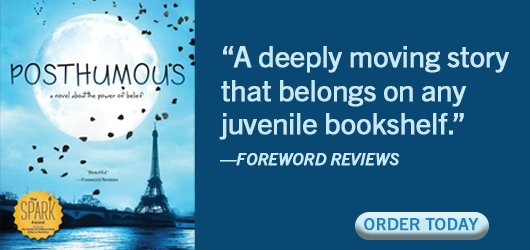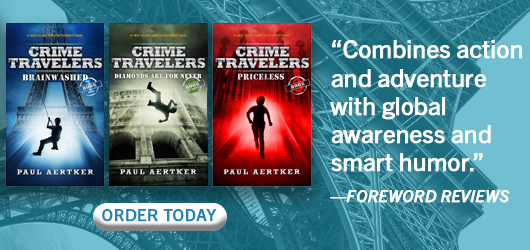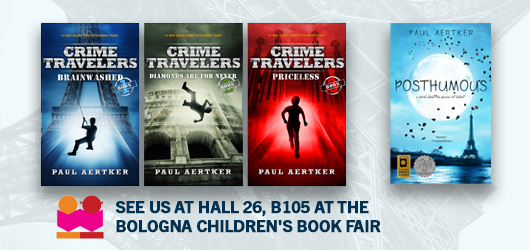Meet Paul Aertker, Award-Winning Middle Grade Author
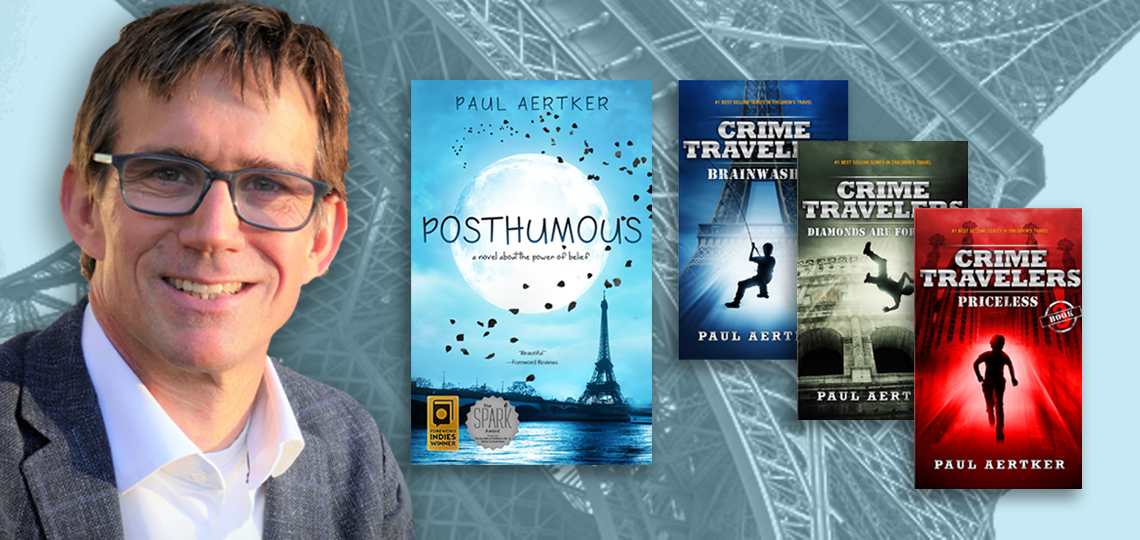
Reviewer Pallas McCorquodale Interviews Paul Aertker, Author of The Crime Travelers Series and Posthumous
We’re always excited to connect our talented reviewers with the authors of books they’ve reviewed in the pages of Foreword Reviews, and today’s conversation is even more special because Pallas McCorquodale reviewed all three—Priceless, Brainwashed, Diamonds Are for Never—of the books in Paul Aertker’s Crime Travelers series. A librarian by day, Pallas often asks a few of her young students to help, so you can look forward to some penetrating questions from Hannah, Javier, and Michael.
Lastly, let’s not forget that Paul’s Posthumous: A Novel About the Power of Belief was reviewed by Catherine Thureson in Foreword’s July/August 2018 issue.
Pallas, it’s showtime!
Paul, congratulations on the success of Posthumous (a Foreword INDIES Book of the Year and SCBWI Spark Honor Award winner) and the Crime Travelers trilogy, which has its TV/Film rights optioned!
Thanks for the compliments, Pallas. This has been a fun journey – it’s certainly been great meeting all the people who’ve helped me along the way!
Do you get to decide who will play Lucas in the movie? My favorite actor is Tom Holland. I think he would be good in this role because he is funny but serious. Also, he has experience in action movies. What do you think? —Hannah, thirteen
Hi Hannah, I think you have a sharp eye for casting. I, too, like Tom Holland, and you’re right, he’s funny and can be serious, like Lucas. I am sending your question to my agent in Hollywood, and we’ll see what she thinks! Seriously.
I admit to lurking on the www.crimetravelers.com website, which I recommend to anyone with a few extra minutes to spare. The “Random Facts” section alone is worth the visit. This comment sparked my curiosity the most, “Can’t wait to sell everything and travel again, I’ve done it once and will do it again.” Can you share a few details about this experience?
My wife and I always wanted to raise our kids in different countries, experience new cultures, and speak other languages. We felt it was important for kids to be exposed to those things early on. With its countries, cultures, and languages being close and accessible, Europe was an obvious choice to start work on the Crime Travelers series.
We had always been digital nomads and could work from home. So when our kids were four and seven, we each packed one suitcase and headed off to Aix-en-Provence, where the kids went to a French Montessori school. After that, we spent the following two years at the American School of Madrid.
Students at ASM came from fifty different countries, and they inspired many of my characters’ attributes. What’s more, the international feel of ASM made us all see how things could work together and how well people from different places could actually get along, thus feeding the premise of Crime Travelers.
Where are you headed next, and are Lucas and the New Resistance gang headed there as well?
Lucas and the New Resistance gang are always in my head, regardless of where I go!
Travel is central to almost everything I do. So the journey motif is central to everything I write. But, you know how the absence of something makes you crave it all the more?
Since the pandemic, I have physically gone to fewer places and have traveled more in my mind—I guess this may be true for many people. Since we aren’t moving around as much, reading and writing have become primary forms of travel.
I am curious about a lot. But I have noticed that any outing—even a simple day trip—quenches my curiosity and scratches that novelty itch. More than that, getting out feeds our creativity, and in turn, imagination fuels our stories, both in reading and writing.
So, I am thankful that Lucas and gang are still with me in my wanderings, whether we can get there physically or not! When I speak to students or readers, I often remind them that it’s not just the writer who has an imagination; readers must bring their imagination—it’s the ticket that allows the story to take you someplace else.
My family is from Guatemala. I have never been there, but they say it is a fun place. Will you do a story in Guatemala?“ —Javier, nine
Hola Javier, Yo tampoco he visitado Guatemala, pero me encantaría visitar y aprender más sobre la cultura maya y las selvas tropicales, y por supuesto, los volcanes. Gracias por la inspiración.
Guatemala is definitely on the list. I have thought about writing an adventure series set in every country. I believe stories should be a celebration of reading and writing and of children and far away places. For me, story is just a better way to learn. Period.
One of the things that sets Crime Travelers apart as a travel/adventure series is its inclusion of current, real world issues—child labor, kidnapping, the illegal ivory trade—just to name a few.
Where did your interest/curiosity about such a wide variety of issues originate?
I grew up as the ninth child of nine, and I always wanted to know what was going on. And as you might guess, I was often left out of conversations. So I had to invent narratives. I had to develop stories to fill in what I didn’t know.
When I started teaching, I quickly noticed how bright middle school students were and how much they wanted to know what was going on in the world. Kids know that our world is not perfect, so in many ways, I am cracking the door open to the possibility that they—the kids—may have solutions to those problems.
In Louis L’Amour Western novels, children were not coddled. They were often called upon to tackle real-world issues facing pioneers. I find it compelling to see kids step in and save the day.
In book one, Lucas’s father says that “grownups have messed up the world, and it’s up to kids to make things right.” So while some of the topics may seem weighty, the tone of Crime Travelers is couched in a kid-friendly format that inspires kids (“A Call to Legs”) to join the bigger conversations that address current world problems.
Although Posthumous is a standalone novel, there were some lovely Easter eggs for Crime Travelers fans. The school principal, for example, bears a striking resemblance to villain-extraordinaire, Siba Günerro, complete with cat-eyed glasses, inside jokes about diapers are recognizable, and both Ella in Posthumous and Lucas in Brainwashed chase clues throughout Paris. Similarities aside, though, Ella’s story of loss and grief is a big departure from the non-stop action and thrills found in Crime Travelers.
You’re an astute reader, Pallas! I think planting surprises and looking for and finding clues makes life (and reading and travel) all the more exciting. But now, my question back to you would be: have you found all the clues?
How did your approach to finding Ella’s voice and crafting her story differ from Lucas’s? Was one more challenging than the other or more rewarding?
Lucas’s voice always came to me while I was working; Ella’s voice always came to me while I was sleeping.
Here’s an odd truth about this story, Posthumous. I wrote the entire first draft during a period of insomnia. I would wake up at 2:00 in the morning and couldn’t go back to sleep. So one night, I gave in and decided to stay awake and start writing.
A funny thing happened on the way to the computer. I noticed that my inner critic stayed asleep. Apparently, he’s a heavy sleeper!
Now, this voice would not tell me that I could not write in Ella’s voice. I had found a secret passage.
For the better part of a year and a half, I would get up at 2:00, sit at the computer, and type for a few hours. Then I would go back to bed, wake up a little late, and open up the laptop. Miraculously, someone had written pages and pages of this wonderful story! It was riddled with typos, misspellings, and poor punctuation, giving the inner critic plenty to work on. But, the story was there, the tone and voice were there, and it was thrilling to think it all happened while I was “sleeping!”
“Fiction helps us understand real life” —Etta Kerr, Posthumous
Good line. Who wrote that? Haha!
I think one way fiction can help us understand real life is when the characters think and feel and react differently than you do in the same situation.
Has any fiction-like books or movies ever made you think about real life differently?“ —Michael, fourteen
Hi Michael. Great question! There are so many. But off the top of my head, The BFG reminds me to hold on to dreams. The Boy Who Harnessed the Wind keeps me curious about everyday objects. And a daily motivator is the classic line from Robin Williams’s character John Keating in Dead Poet’s Society, “Carpe Diem! Seize the day, boys. Make your lives extraordinary!”
Some of my favorite grownup books are page-turners. Ludlum, Evanovich, and in movies, Omar Sy’s character in Lupin is oddly close to one of the ways I think in real life. These action adventures become guides in real life or, maybe, hypotheticals. What would I do?
Lucas Benes, the protagonist in the Crime Travelers series, loves to catalog everything he sees. When traveling, I often find myself doing the same, noticing minute details as I focus on data points that might be useful. For what? I don’t always know.
When I travel in Europe, I often wander small alleyways and half-deserted streets listening for voices beneath music from a farther room … and then I know that T.S. Eliot has crept into my mind.
Once fiction is part of your thinking, you can’t help but create. Ideas. Stories. Solutions. This is why I like to tuck myself into a corner table in a café and order some thick hot chocolate, and start plotting my next move, in real life or in fiction!
Let’s talk about Etta Kerr (whose name sounds an awful lot like Aertker), the would-be author of a children’s book series, Explore the World. She overheard a snippet of conversation and the wheels began to turn, “‘There are almost two hundred member nations in the UN, but only six official languages.’ ‘What are the languages?’”
You’re on to me, Pallas! To answer the question. The six languages are Arabic, Chinese, English, French, Russian, and Spanish.
Does Etta’s love of travel, culture, and storytelling mirror your own? Is her character autobiographical at all? Is Etta, the communications director at the Parisian New Resistance in Brainwashed (Crime Travelers, book one) also Ella’s mom (from Posthumous)?
Yes, on all counts! Good sleuthing on your part! I think anything that I have ever written is, to some degree, autobiographical. This is probably true for most writers. Etta Kerr’s life most certainly mirrors my own in that I am no stranger to rejection letters. But honestly, I am more than the mom in Posthumous who writes fun books for kids. I am the dad who likes international business. I am the kid who likes art, languages, and scavenger hunts. I am Munda, the Caribbean cook who uses food to heal. I am the French guy who likes to lighten things up. And, mostly, I am Ella, the twelve-year-old who is determined against the odds. She and I embrace independence, and we both think Indie is cool. Sometimes, it just takes a kid’s point of view to see things clearly.
Do you have any plans to make the fictitious Explore the World series a reality? When I first read that passage, I thought, “How perfect! I will absolutely read that series.” Also, I hope the books are released in alphabetical order because my librarian’s heart loves ABC order (ask any of my students).
I have played around with this idea several times and have not given up. For your librarian’s heart, I know the first three books will be: Afghanistan, Albania, and Algeria! We are all wired for story, no matter where we are or where we were born, and I would love to find more stories from different parts of the world.
I often wonder if everyone, the world over, had better access to writing and publishing, what new stories would we hear? What tales are we missing today? The best stories that we have never read might be in the mind of a mother in Ouagadougou. Does a boy in Bandar Seri Begawan have some extraordinary story that he’s written about life there? Maybe a teenager in Antananarivo has found part of a plane floating in the Indian Ocean. Maybe her nonfiction could help us find that missing airplane!
I would love to write more stories, but more than that, I would love to find the people, grownups, and kids in these different parts of the world and let them write and tell their own stories. That would be the best! Who’s with me?
POSTHUMOUS
A NOVEL ABOUT THE POWER OF BELIEF
Paul Aertker
Flying Solo Press (Jun 1, 2018)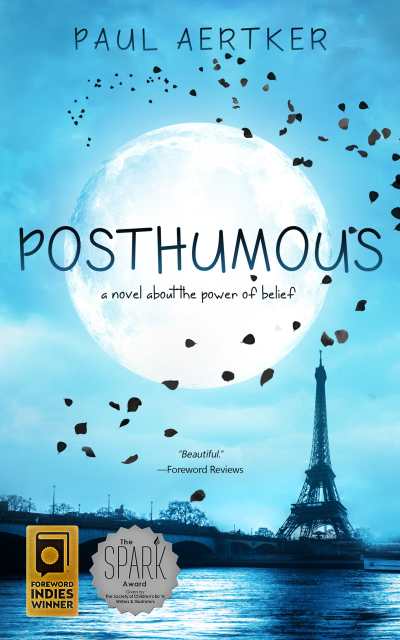
Softcover $9.95 (200pp)
978-1-940137-99-5
2018 INDIES WinnerBronze, Juvenile Fiction (Children’s)
Beautiful and emotional, Posthumous is about Ellie, a twelve-year-old girl trying to deal with her mother’s death.
Life in Paris is pretty great for Ellie and her parents. Ellie’s father, Calvert, works for the man who would have been the king of France. Ellie’s mother, Etta, writes travel stories for children, though she has never been published. Then one day Etta complains of bad back pain, and life changes very quickly.
In the first half of the story Ellie describes the process of her mother dying, how Etta tried to stay positive, and of the friends and neighbors who rallied around her family. Tears are guaranteed as the story tracks the family’s enormous grief.
After Etta passes, Ellie and her father move back to the United States. Ellie wants to get her mother’s manuscripts published. She enlists the help of new friends in this endeavor, as well as in making a new home.
The novel is both sad and lovely. Ellie’s reactions to the loss of her mother are authentic, as are her expressed feelings of powerlessness. Her bravery and tenacity when it comes to Etta’s manuscripts serve as a powerful tribute to a daughter’s love. Children who have lost a parent will relate to Ellie and find comfort in sharing her story, but empathy is ensured for all.
Posthumous is about love and hope and finding joy, even through incredible loss. It is a deeply moving story that belongs on any juvenile bookshelf.
Reviewed by Catherine Thureson
The Crime Travelers series combines action and adventure with global awareness and smart humor.
Book 1: Brainwashed
Full of exotic locals and locales, the international stage is set, and Paul Aertker’s Brainwashed leaves the door wide open for future installments in the Crime Travelers series. Middle school grades will appreciate the clever mix of world facts, fun, and fantastic fiction. Review of Brainwashed (9781940137117) — Foreword Reviews
Book 2: Diamonds Are For Never
An international adventure with a thoughtful layer of emotion, Diamonds Are for Never is a smart choice for middle school grades looking for an action thriller with humor and heart. Review of Diamonds Are for Never (9781940137254) — Foreword Reviews
Book 3: Priceless
A spy thriller with both brains and brawn, Paul Aertker’s Priceless will appeal not only to middle-grade kids but to parents and teachers as well. Review of Priceless (9781940137377) — Foreword Reviews
Pallas McCorquodale

